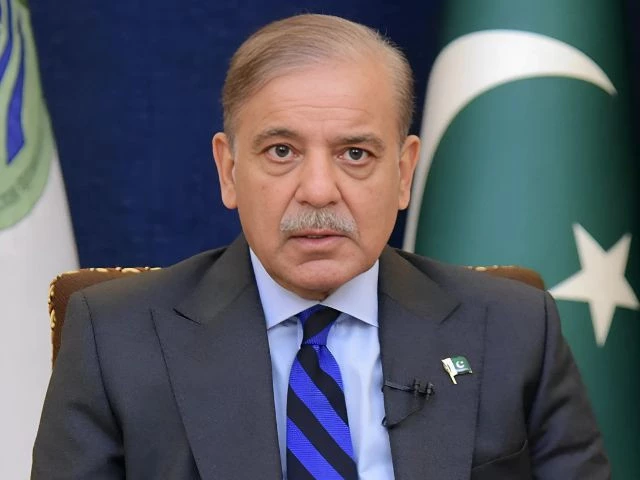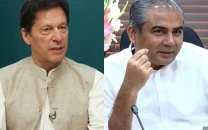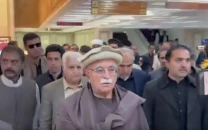PM Shehbaz briefs political leaders on response to India
Leaders of major political parties praise the professionalism and restraint shown by Pakistan’s armed forces.

Prime Minister Shehbaz Sharif on Saturday said Pakistan’s armed forces had delivered a strong, coordinated, and powerful response to Indian aggression, avenging the loss of innocent lives, as he briefed senior political leaders on the country’s security situation and military retaliation.
According to the Prime Minister’s Office, Shehbaz Sharif held separate telephone conversations with Pakistan Peoples Party (PPP) Chairman Bilawal Bhutto Zardari, Pakistan Tehreek-e-Insaf (PTI) Chairman Barrister Gohar, Jamiat Ulema-e-Islam - Fazl (JUI-F) leader Maulana Fazlur Rehman, Muttahida Qaumi Movement – Pakistan (MQM-P) Convener Khalid Maqbool Siddiqui, Jamaat-e-Islami (JI) Emir Hafiz Naeem ur Rehman, Balochistan Awami Party (BAP) head Khalid Hussain Magsi, and Pakistan Muslim League - Quaid (PML-Q) leader Chaudhry Salik Hussain.
The Prime Minister took the political leadership into confidence over Pakistan’s retaliatory military campaign, Operation Bunyan-un-Marsoos, launched in response to India’s recent missile and drone strikes. He said Indian forces targeted civilian areas, including Nur Khan Airbase, causing casualties and damage.
Sharif stated that Pakistan had initially exercised restraint following the Pahalgam incident, calling for an impartial international investigation—an offer rejected by New Delhi. He added that Pakistan’s military targeted specific Indian installations identified as launch sites for attacks against Pakistan.
“This morning, India again carried out missile attacks on civilian sites,” he said, adding, “Our brave armed forces have given a befitting response, and we are proud of their professionalism and resolve.”
The Prime Minister praised the success of the military operation and expressed gratitude to political leaders for their unified support. He reiterated Pakistan’s determination to defend its sovereignty and territorial integrity against any future aggression.
In their responses, leaders of major political parties praised the professionalism and restraint shown by Pakistan’s armed forces. PPP Chairman Bilawal Bhutto Zardari commended the Prime Minister’s leadership during the crisis and said the entire nation stood united behind the military.
Brink of war
Tensions between India and Pakistan escalated sharply following the April 22 attack in Pahalgam, located in Indian Illegally Occupied Jammu and Kashmir (IIOJK), which left 26 people dead. India blamed Pakistan-based elements for the attack without presenting evidence. Islamabad categorically rejected the accusations.
In response, India closed the Wagah land border, revoked Pakistani visas, and announced the suspension of the Indus Waters Treaty on April 23.
Pakistan labelled any disruption to the treaty as an “act of war” and subsequently sealed the Wagah crossing on its side.
The situation further deteriorated on May 6 and 7, with explosions reported in several Pakistani cities including Muzaffarabad, Kotli, Muridke, and Bahawalpur.
Pakistan’s military spokesperson, Lieutenant General Ahmed Sharif Chaudhry, confirmed that Indian airstrikes had targeted multiple locations. Pakistan responded with air and ground operations under a new military campaign named Operation Bunyan-un-Marsoos.
Within the first hour of retaliation, Pakistan claimed to have downed five Indian fighter jets, including four Rafale aircraft. Lt Gen Chaudhry stated that Pakistan had the capability to down more but exercised restraint. Indian media provided limited coverage, with one report by The Hindu later retracted.
International observers, including analysts on CNN, noted the downing of Rafale jets has challenged India’s narrative of regional air superiority.
A senior French intelligence official also confirmed the loss of one Rafale aircraft to CNN—the first combat loss for the jet.
In addition, Pakistan’s armed forces reported intercepting and neutralising 77 Israeli-made Harop drones allegedly launched by India.
According to the Inter-Services Public Relations (ISPR), the drones were brought down using a mix of electronic warfare and conventional air defence systems.
Security sources confirmed that Operation Bunyan-un-Marsoos is targeting bases identified as launch points for attacks on civilians and mosques.
Pakistan also launched its Al-Fatah missile as part of the operation, in honour of children killed during recent Indian attacks.
Pakistan’s Defence Minister Khawaja Asif has stated that no meeting of the National Command Authority (NCA) has taken place, nor is one planned.
“There has been no meeting of the National Command Authority, nor is any such meeting scheduled,” Asif told ARY News,
Earlier today in a press conference held in New Delhi, Indian Air Force Wing Commander Vyomika Singh stated that India remained committed to de-escalation, but only if Pakistan took reciprocal steps.
The briefing was held alongside Indian Army Colonel Sophia Qureshi and Foreign Secretary Vikram Misri. Colonel Qureshi confirmed that Pakistan’s strikes had caused damage to equipment and injuries to personnel at five airbases — Udhampur, Pathankot, Adampur, Bhuj, and Bathinda — after targeting more than 26 sites.























COMMENTS
Comments are moderated and generally will be posted if they are on-topic and not abusive.
For more information, please see our Comments FAQ